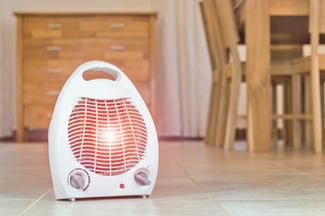
Heating equipment is a major cause of fire deaths. Understanding and eliminating the associated risks can significantly enhance fire safety. By understanding the risks and taking some basic safety precautions, you can prevent most heating fires.
Heating equipment includes furnaces, space heaters, fireplaces, and water heaters. Remember, safety is a shared responsibility, and by working together you can create a safer environment for everyone.
Candles and Fireplace Risks
Candles and fireplaces create a cozy ambiance but pose a serious fire risk if not handled properly. Always keep burning candles within sight and away from children, pets, and flammable materials. Place them on stable, heat-resistant surfaces, extinguish them before they burn completely down, and never leave them unattended.
Larger (non-confined) fires involving fireplaces or chimneys caused just over one-fourth of the direct property damage (27%). For fireplaces, ensure proper ventilation to avoid smoke buildup and always clean out ash from previous fires. Be sure to clean the chimney annually and install safety screens to protect children and pets.
Space Heater Risk

Space heaters are a convenient way to supplement heat, but they can be dangerous if misused. They are responsible for approximately 88% of home heating fire deaths. Maintain a safe distance between space heaters and anything flammable; keep them three feet away from walls, people, and water sources. Never leave them unattended, always place them on a stable, level surface, and avoid using extension cords. For added safety, choose a certified heater with a tip-over safety switch.
HVAC Equipment Risks and Maintenance
HVAC equipment poses unique potential hazards, such as gas leaks, electrical malfunctions, and overheating. Regular maintenance and inspections by qualified professionals will help to ensure your heating system operates safely and efficiently.
Regular HVAC maintenance is crucial for safe and efficient heating. Schedule professional inspections and tune-ups annually. Replace air filters regularly to maintain optimal airflow and system performance. Be mindful of any unusual noises or odors which could indicate a problem. Proper insulation can also reduce heating needs and improve overall safety. Have a qualified professional install heating equipment according to the local codes and manufacturer’s instructions.
General Heating Safety
General heating safety involves more than just appliance maintenance. Install smoke and carbon monoxide detectors and test them regularly. Keep a fire extinguisher handy and create a fire escape plan. Never use an oven or stove for heating, as this can lead to carbon monoxide poisoning. Store flammable materials away from heat sources and ensure adequate ventilation throughout your business or home.
This winter, keep your people and property safe by following the advice above. Want even more tips and tricks? Explore our other blogs to learn how to keep safety top of mind, regardless of the season or circumstance.